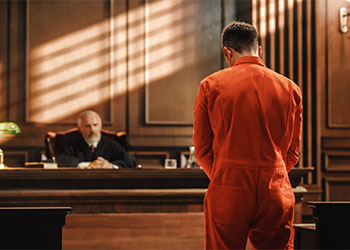What to Expect at Your Trial
July 21, 2023
 If you’re facing a criminal charge in or around Los Angeles, California, you may or may not end up going before a judge and jury. There are pretrial hearings and steps that can be taken prior to a trial that can either lead to a dismissal of the charges or a plea bargain that can be worked out with prosecutors. But if your case is headed to trial, you must remember to exercise your Constitutional rights.
If you’re facing a criminal charge in or around Los Angeles, California, you may or may not end up going before a judge and jury. There are pretrial hearings and steps that can be taken prior to a trial that can either lead to a dismissal of the charges or a plea bargain that can be worked out with prosecutors. But if your case is headed to trial, you must remember to exercise your Constitutional rights.
Under the Sixth Amendment to the Constitution, you are entitled to a speedy public trial before a jury of your peers. You are also entitled to legal representation, and prosecutors must meet the high legal bar of proving their case against you “beyond a reasonable doubt” with a unanimous decision of the jurors. All that being said, facing a trial on a criminal charge can be a frightening experience.
Your first step, if a criminal trial looms, is to obtain the best criminal defense attorney you can. In the Los Angeles area, contact the legal team at The Law Office of John Goalwin. Attorney John Goalwin has more than four decades of experience in helping clients facing criminal charges exercise their rights and fight for the best possible outcome. He also helps clients throughout Southern California, including Torrance, Norwalk, Van Nuys, and Compton.
The Criminal Trial Process
As mentioned briefly above, there are hearings and negotiations that take place before a case even goes to trial. Many cases are resolved through plea bargains before a trial begins. Prosecutors often agree to lesser charges to obtain a guilty plea and avoid the time and expense of an actual courtroom battle. Whether you wish to seek a plea bargain or go to trial is an issue you should discuss with your defense attorney.
If there is to be a trial, the first stage in the process is selecting a panel of jurors. This process is known as voir dire, which is French for “to tell the truth.” In this phase of the trial, potential jurors are questioned by both defense and prosecutors to determine whether they have any prejudices or opinions that could sway their decision in the upcoming trial. Both sides are given a number of “peremptory challenges” to exclude potential jurors.
Once the jury is empaneled, opening statements will be offered by both prosecutors and defense, outlining what their arguments are. This will be followed by the prosecutors calling on witnesses and introducing the evidence they deem essential to prove their case. The judge prior to this phase may have excluded certain evidence because of motions made by the defense or because of the exclusionary rule, which bars the introduction of privileged communications and certain other forms of evidence.
After the conclusion of the prosecutor’s case, the defense can move for a directed verdict or a judgment of acquittal, claiming that the evidence presented is “insufficient to sustain a verdict.” Most courts are limited in granting these motions, however, and the trial then proceeds to the defense phase.
The defense team can then call witnesses and introduce other evidence supporting the defendant’s position in the criminal charge. Under the Fifth Amendment and its protection against self-incrimination, the defendant cannot be compelled to testify as a witness. A defendant under the Constitution is innocent until proven guilty, so the prosecution must prove its case “beyond a reasonable doubt.”
When witnesses are called or evidence is introduced by either side, the opposing side can cross-examine or challenge the testimony or evidence. When both sides have presented their evidence and issued their closing arguments, the judge will instruct the jury on the elements of the charged offense, a process known as the “jury charge.” The jurors will then deliberate the evidence.
If they cannot reach a unanimous decision, the judge can declare a mistrial. If there is a guilty verdict, the defense can offer post-trial motions, such as a motion for a judgment of acquittal or a motion for a new trial. If those motions are denied, the defense can appeal to a higher court.
You Deserve a Strong Defense
If you are facing a criminal charge, there can be serious consequences depending on the crime involved. Even for a misdemeanor, you will end up with a criminal record if convicted that can haunt you for the rest of your life, limiting employment opportunities and even some public benefits. This holds true if you accept a plea bargain as well. Your best option is to seek and retain a skilled criminal defense team.
In the Los Angeles area and surrounding communities, reach out to The Law Office of John Goalwin if you’re facing a criminal charge. You will be aggressively defended and your rights protected in the pursuit of the best possible outcome.